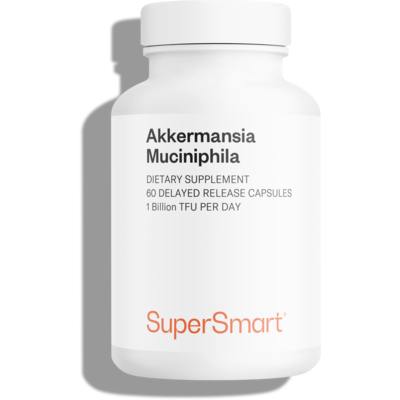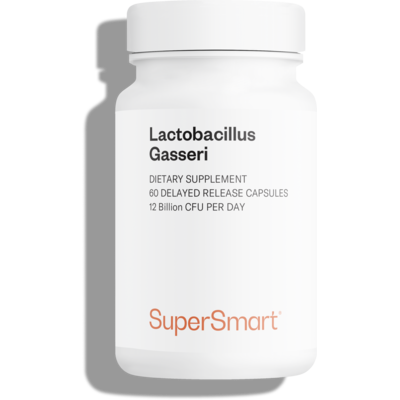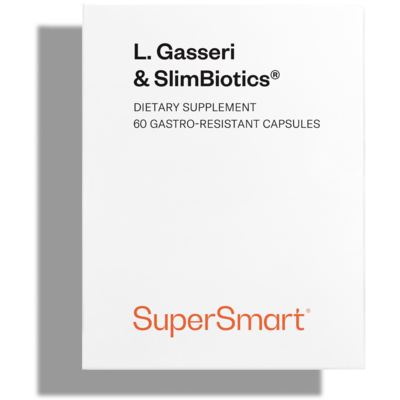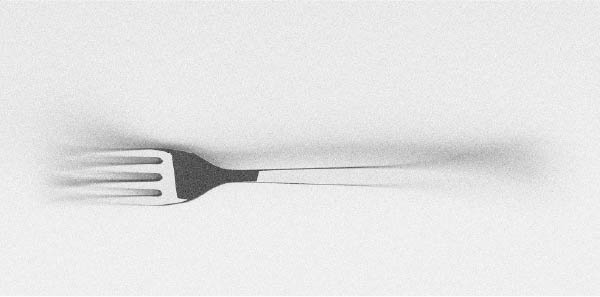Do probiotics help you lose weight?
Increasingly present on health shelves, probiotics are arousing keen interest among those who want to lose weight naturally.

Probiotics: why are they good for digestive health?
According to the WHO (World Health Organisation), probiotics are living micro-organisms (mainly bacteria) which, when ingested in sufficient quantities, have a beneficial effect on the health of the host.
They are found naturally in certain fermented foods (yogurt, kefir, miso, etc.) or in the form of concentrated food supplements, which are better dosed and more targeted.
Their main role? To help balance the intestinal microbiota (1), the complex ecosystem that lines our digestive tract and plays an essential role in digestion, immunity, vitamin production and protection against pathogens.
Although they were first known for their impact on digestive health, some probiotics are now attracting research interest for their potential effects on weight regulation.
Probiotics and weight loss: what does science have to say?
Numerous scientific studies are looking into the potential role of probiotics in regulating body weight, suggesting a close interaction between intestinal flora and metabolism.
The microbiota: a key player in metabolism
A diverse and balanced intestinal microbiota could play an essential role in managing body weight, by acting on several interdependent physiological mechanisms:
- Fermentation of dietary fibres: certain bacteria in the intestinal microbiota are capable of fermenting undigested fibres in the small intestine. This fermentation produces short-chain fatty acids (SCFAs), which are thought to influence energy expenditure and reduce the chronic low-grade inflammation often associated with obesity (2).
- Regulation of glycemia and insulin: according to certain studies, certain bacterial strains appear to be capable of reducing carbohydrate absorption and improving insulin sensitivity (3). They are thought to help reduce blood sugar peaks after meals and limit sudden insulin secretions – a key factor in fat storage – thus contributing to better weight control.
- Regulation of the sensation of satiety: certain intestinal bacteria are thought to influence the production of leptin (the satiety hormone) and ghrelin (the hunger hormone). A balanced microbiota could therefore promote a better balance between hunger and satiety (4), reducing cravings and overeating.
- Strengthening the intestinal barrier: probiotics are thought to help strengthen the intestinal mucosa and limit the passage of undesirable substances into the bloodstream (endotoxins) (5). They could indirectly limit the inflammatory processes associated with weight gain.
Intestinal imbalance associated with obesity
Research has shown that people who are overweight or obese often have reduced microbial diversity, as well as an imbalance between certain bacterial families (6). Rebalancing the microbiota through targeted probiotic supplementation could therefore be an interesting way of supporting weight loss.
Probiotics cannot be considered instant fat burners. However, when combined with a balanced diet and regular physical activity, they can actively support certain natural mechanisms.
By contributing to the balance of the intestinal microbiota (7), they can potentially help to improve digestion, regulate appetite, modulate glycaemic response and reduce chronic inflammation. These are all factors linked to weight management.
3 promising probiotics for slimming
Certain species of probiotics are currently the subject of in-depth studies. They could have potential effects on weight management, particularly for people with excess abdominal fat or a large waistline. Here is a look at the three most promising strains to date.
Lactobacillus gasseri: potential support against abdominal fat
Lactobacillus gasseri is a strain naturally present in the human microbiota. Several clinical studies have highlighted its possible effects on reducing waist and hip circumference (8).
How does it work?
- It is thought to promote the production of SCFAs, thereby reducing inflammation and fatty deposits.
- It may reduce the absorption of dietary fats and improve intestinal transit.
- Its influence on leptin could help to better regulate appetite.
This relatively resistant strain can be taken as a food supplement to ensure a targeted, concentrated intake.
- Discover the Lactobacillus Gasseri food supplement, which provides a daily dose of 12 billion microorganisms.
The Lactobacillus gasseri strain can also be combined with other specific strains, with effects supported by clinical studies.
- Discover the L. Gasseri & SlimBiotics dietary supplement, formulated to help you manage your weight naturally and comprehensively.
No serious danger has been reported in healthy adults taking this strain. However, as with any dietary supplement, it is advisable to seek the advice of a health professional if you have a medical condition or are undergoing treatment.
Lactobacillus fermentum: possible reduction in adipose tissue
Lactobacillus fermentum, a lactic acid strain also under study, is thought to have an anti-inflammatory and antioxidant effect, and to help modulate body composition.
Several animal studies have shown a significant reduction in body fat and an improvement in metabolic markers after prolonged supplementation (9).
Its mode of action is thought to combine:
- strengthening the intestinal barrier;
- improving lipid metabolism;
- managing dietary carbohydrates more effectively.
Combined with L. gasseri, the Lactobacillus fermentum strain is ideal for weight control.
- Discover the L. Gasseri & SlimBiotics food supplement, which combines these two strains for a targeted slimming duo.
Akkermansia muciniphila: the new star of the slimming microbiota?
The recently discovered intestinal bacterium Akkermansia muciniphila is attracting growing interest in the scientific world.
Insufficient levels of this strain have been associated with increased abdominal fat, insulin resistance and low-grade inflammation, all factors often linked to obesity and metabolic disorders (10).
Why is this bacterium so special?
- It is thought to play an essential role in strengthening the intestinal mucosa.
- It is thought to help regulate the metabolism of sugars and fats.
- It is also thought to improve insulin sensitivity.
Clinical studies have shown that supplementation with Akkermansia muciniphila could reduce visceral fat and improve metabolic parameters in overweight people (11).
- Discover the Akkermansia Muciniphila food supplement, specifically designed to accompany a slimming diet.
Probiotics and slimming: where do they fit in?
Probiotics are no substitute for a healthy diet or regular exercise. However, they do provide valuable support for sustainable weight loss, particularly by acting on invisible factors such as inflammation, digestion, fat storage and feelings of hunger.
The diversity and balance of the microbiota play a key role in many metabolic functions. Supporting the intestinal flora with targeted strains such as L. gasseri, L. fermentum or Akkermansia muciniphila could therefore help optimize the results of a healthy, slimming-oriented lifestyle.
SUPERSMART ADVICE
References
- Azad MAK, Sarker M, Li T, Yin J. Probiotic Species in the Modulation of Gut Microbiota: An Overview. Biomed Res Int. 2018 May 8;2018:9478630. doi: 10.1155/2018/9478630. PMID: 29854813; PMCID: PMC5964481.
- Cox AJ, West NP, Cripps AW. Obesity, inflammation, and the gut microbiota. Lancet Diabetes Endocrinol. 2015 Mar;3(3):207-15. doi: 10.1016/S2213-8587(14)70134-2. Epub 2014 Jul 22. PMID: 25066177.
- Saad MJ, Santos A, Prada PO. Linking Gut Microbiota and Inflammation to Obesity and Insulin Resistance. Physiology (Bethesda). 2016 Jul;31(4):283-93. doi: 10.1152/physiol.00041.2015. PMID: 27252163.
- Van de Wouw M, Schellekens H, Dinan TG, Cryan JF. Microbiota-Gut-Brain Axis: Modulator of Host Metabolism and Appetite. J Nutr. 2017 May;147(5):727-745. doi: 10.3945/jn.116.240481. Epub 2017 Mar 29. PMID: 28356427.
- Di Vincenzo F, Del Gaudio A, Petito V, Lopetuso LR, Scaldaferri F. Gut microbiota, intestinal permeability, and systemic inflammation: a narrative review. Intern Emerg Med. 2024 Mar;19(2):275-293. doi: 10.1007/s11739-023-03374-w. Epub 2023 Jul 28. PMID: 37505311; PMCID: PMC10954893.
- Gomes AC, Hoffmann C, Mota JF. The human gut microbiota: Metabolism and perspective in obesity. Gut Microbes. 2018 Jul 4;9(4):308-325. doi: 10.1080/19490976.2018.1465157. Epub 2018 May 24. PMID: 29667480; PMCID: PMC6219651.
- Chandrasekaran P, Weiskirchen S, Weiskirchen R. Effects of Probiotics on Gut Microbiota: An Overview. Int J Mol Sci. 2024 May 30;25(11):6022. doi: 10.3390/ijms25116022. PMID: 38892208; PMCID: PMC11172883.
- Kim J, Yun JM, Kim MK, Kwon O, Cho B. Lactobacillus gasseri BNR17 Supplementation Reduces the Visceral Fat Accumulation and Waist Circumference in Obese Adults: A Randomized, Double-Blind, Placebo-Controlled Trial. J Med Food. 2018 May;21(5):454-461. doi: 10.1089/jmf.2017.3937. Epub 2018 Apr 24. PMID: 29688793.
- Molina-Tijeras JA, Diez-Echave P, Vezza T, Hidalgo-García L, Ruiz-Malagón AJ, Rodríguez-Sojo MJ, Romero M, Robles-Vera I, García F, Plaza-Diaz J, Olivares M, Duarte J, Rodríguez-Cabezas ME, Rodríguez-Nogales A, Gálvez J. Lactobacillus fermentum CECT5716 ameliorates high fat diet-induced obesity in mice through modulation of gut microbiota dysbiosis. Pharmacol Res. 2021 May;167:105471. doi: 10.1016/j.phrs.2021.105471. Epub 2021 Jan 30. PMID: 33529749.
- Rodrigues VF, Elias-Oliveira J, Pereira ÍS, Pereira JA, Barbosa SC, Machado MSG, Carlos D. Akkermansia muciniphila and Gut Immune System: A Good Friendship That Attenuates Inflammatory Bowel Disease, Obesity, and Diabetes. Front Immunol. 2022 Jul 7;13:934695. doi: 10.3389/fimmu.2022.934695. PMID: 35874661; PMCID: PMC9300896.
- Depommier C, Everard A, Druart C, Plovier H, Van Hul M, Vieira-Silva S, Falony G, Raes J, Maiter D, Delzenne NM, de Barsy M, Loumaye A, Hermans MP, Thissen JP, de Vos WM, Cani PD. Supplementation with Akkermansia muciniphila in overweight and obese human volunteers: a proof-of-concept exploratory study. Nat Med. 2019 Jul;25(7):1096-1103. doi: 10.1038/s41591-019-0495-2. Epub 2019 Jul 1. PMID: 31263284; PMCID: PMC6699990.
Keywords
4 Days
great products and prices
great products and prices
Marie
10 Days
Easy to navigate site
Easy to navigate site, had what I was searching for, good price. easy order-check out
James Tucker
16 Days
My skin is clearing up nicely!
Pretty good for my skin so far.
Christian
18 Days
The new packaging is excellent
The new packaging is excellent - finally! No more squashed boxes and torn envelopes.
GORAN
19 Days
Great Product
Great Product
Larry Garrett
23 Days
Quick shipping
Quick shipping; good price. No issues!
Mary McCarty
25 Days
Thr product is very good and is helping…
Thr product is very good and is helping me on my health. Then is always on time
LUGO Luz
27 Days
Buying was fine
Buying was fine. I had problems with the website not recognizing my login info, and had to call to get it fixed. Other than that, everything was good.
David S. Clark
28 Days
Your super maca and super ginseng are…phenomenal
Your super maca and super ginseng are phenomenal supplements that compliment each other when taking them together. Fantastic feeling of well-being and lots of mid day energy without the crash.
Keith Mason
30 Days
I have had amazing results with every…
I have had amazing results with every supplement I've purchased. I am extremely satisfied with this company
kirstin Torres
30 Days
Fine products
Fine products . They are on the leading edge of online supplements. The only issue -so far-is they sometime run out of subscription items.
Jason Argos
33 Days
The ordering process is very user…
The ordering process is very user friendly and the products always come in a timely manner.
CARTER Rhonda
34 Days
The price for Dr
The price for Dr. Pero's AC-11 is reasonable and in line with his views. (my former colleague). Keep it pure.
CAMPBELL Clayton
37 Days
Right on every time.
Right on every time.
Arthur Nicholas
40 Days
They are cheaper than everyone else and…
They are cheaper than everyone else and the shipping was fast. Great company.
Patricia Adams







